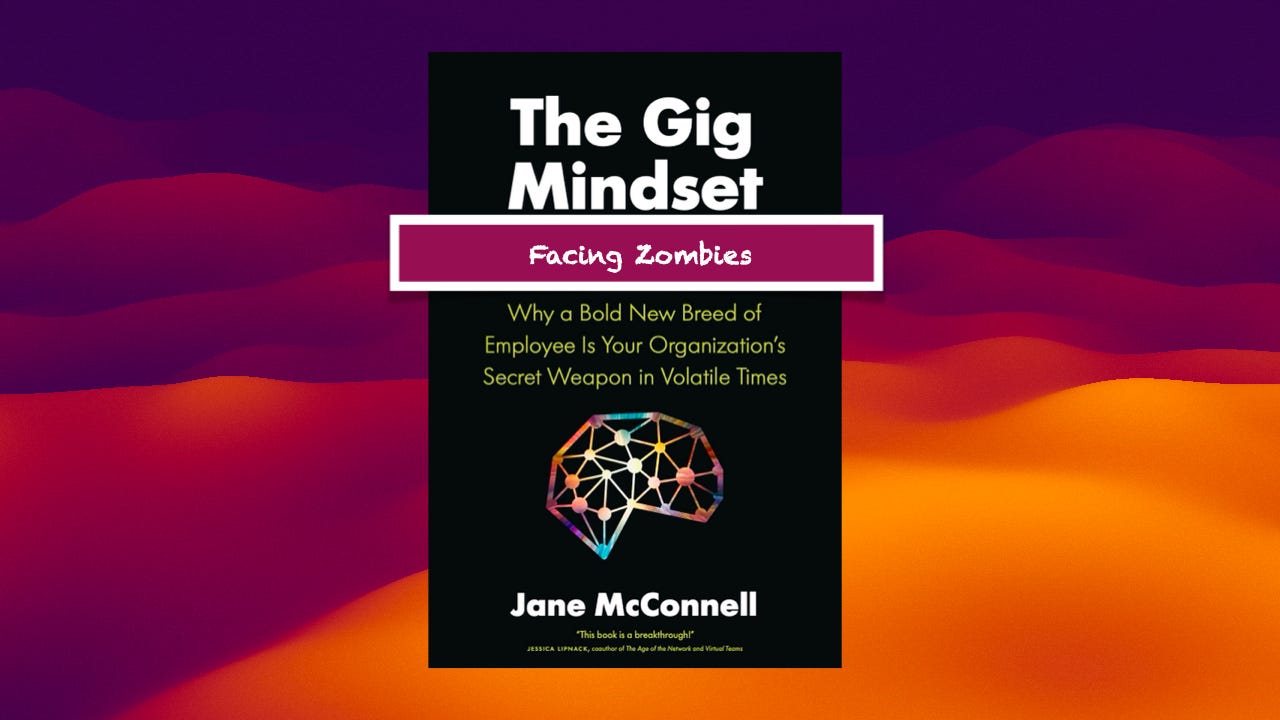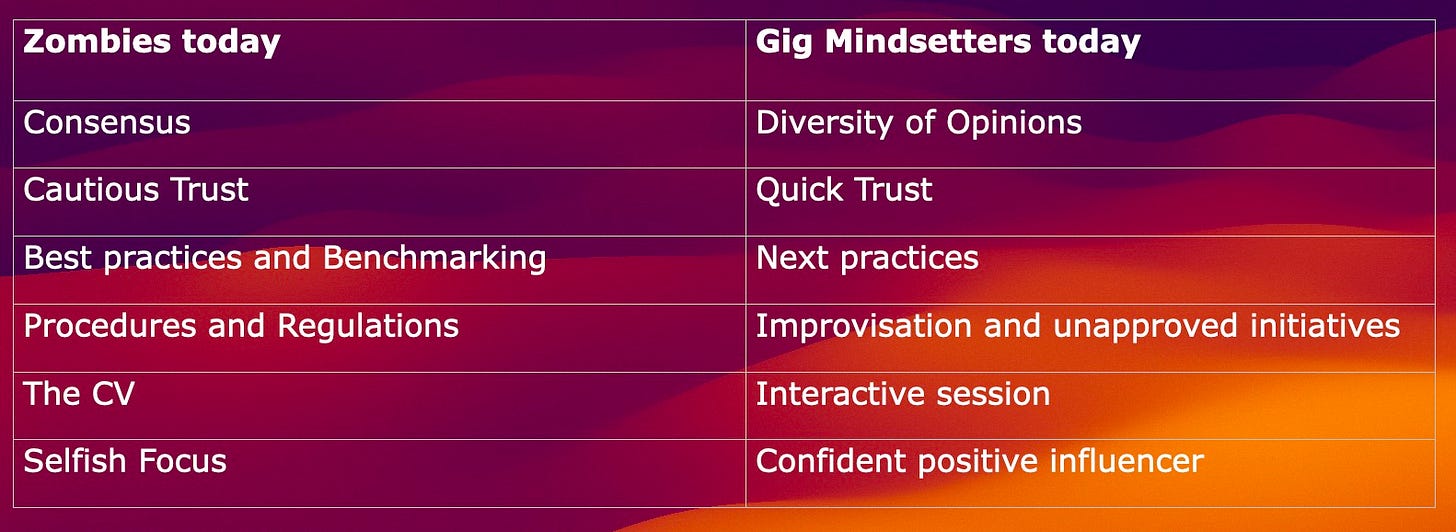I have had a note in my ‘to write’ folder for a couple of years: “Zombie Artifacts Still Living in Our Organizations”
When I read Bill Fischer’s piece in Forbes this week “Beware of Zombie Ideas: Old Ideas That Haunt Decision Making”, which I strongly recommend you read, it took me back to my notes which included a short list from my 2021 book “The Gig Mindset Advantage: Why a Bold New Breed of Employee Is Your Organization’s Secret Weapon in Volatile Times”.
Today, the title could be Gig Mindsetters Facing Zombies!
Let’s go through my list, which I have filled out with comments and extracts from my book.
Consensus
Diversity of opinions makes better decisions
‘Trying to build consensus actually decreases resilience because it means there will be a limited number of opinions and options to consider when a crisis hits and decisions need to be made quickly. In addition, as we live a period of permanent uncertainty, today’s consensus will likely be wrong tomorrow.’ (extract The Gig Mindset Advantage page 65)
This should not surprise us as we all know how uncertain things are, even though we do not necessarily take that into account when we work, make decisions, live our lives. The more diversity we have in our discussions, the more likely to make decisions that will last, meaning, evolve as circumstances change.
Cautious Trust
Swift trust until proven otherwise
‘Trust is usually built as people work together, but in today’s global, virtual workplace, that is often impossible. Swift trust [1] is not based on a history of interactions and shared experiences, as is the traditional concept of trust. It occurs when a group or team immediately assumes trust from the beginning and adjusts along the way as circumstances dictate.’ (extract The Gig Mindset Advantage page 88)
Again we are moving with circumstances, not holding a position in spite of what changes around us. Trust until proven otherwise, we could say.
Best Practices and Benchmarking
Next Practices, not Best Practices
Best practices and benchmarking have long been considered infallible clues to help set strategies and define actions. However, they are both based on the past. Today, decisions need to be made in face of future. Taking into account unknowables. What could be easier, you say!
‘Focusing on the future does not mean forgetting the past. It does not mean ignoring traditional benchmarking and best practices that others are following. It does mean looking forward and not using the past as your only guide to the future—and not assuming that your traditional competitors are the most relevant organizations to watch today.
Forgetting curve more important than learning curve
'Corporate strategist and author C.K. Prahalad emphasized the importance of looking forward rather than backward when he wrote that the forgetting curve was more important than the learning curve, and advised organizations to look for next practices rather than studying best practices.
One problem with the way most organizations do benchmarking is their comparison of what they are doing with what their peer organizations are doing. Today, it is less certain that your traditional peers will still be your competitors tomorrow. The global tech giants are entering new markets. Amazon has moved into retail grocery shopping; Google is active in the automotive industry with self-driving. What some of us may have missed is that traditional companies are beginning to do the same. … It has become hard to predict where and when your next competitor will appear.' (extract The Gig Mindset Advantage pages 30-31)
Improvisation
Improvisation requires speed and happens in real time, with no time for reflection and planning. Without it, an organization or individual cannot be resilient.
When faced with the unexpected, being able to improvise can open doors. Following accepted procedures and regulations is usually not the answer.
‘Improvisation is creating something new based on something that already exists. It is not creating something out of nothing. You use what you have at hand, but in a different way.
The work culture must be flexible, with a minimum number of layers and processes limited to only what is essential. Above all, there must be a willingness to accept experimentation and to learn from failures.
Improvisations range from small to major. Some will result in changes in how work takes place in the future. Others will prove to be short-lived, appropriate only for that particular unexpected event. The value of improvisation can be judged only after the fact.
Improvisation takes place when you are faced with an urgent, unexpected, and unplanned-for event and you try something new based on what you have available. It requires speed and happens in real time, with no time for reflection and planning.’ (extract The Gig Mindset Advantage pages 84-85)
The CV
Focusing on CVs and missing the most talented people
We can all agree that because times are uncertain, organizations need people who are comfortable in ambiguous, complex situations where the “right thing to do” is not obvious.
I interviewed a business manager who describe how they evaluated job candidates:
“We are more interested in people who ask a lot of challenging questions in the job interview than those who simply ask questions about the company’s business model and ways of working.”
The old days of evaluating skills and knowledge based on a CV are gone. Organizations hiring based on the CV will likely some of the most talented people around today. Academic diplomas give less information than do the behaviors of the person.
A project manager in a global insurance company described their approach:
“We invite people who interest us into a day-long work session, a real work session with our team. We want to see how they interact with the other people. That’s very different from the past when job candidates just got interviewed by an HR person and the manager and either got the job or didn’t. This approach gives us a better sense of what they are like. It’s good for the person as well, who gets a feeling for the team dynamics and how people work together. Of course, it makes some people nervous, but that’s normal. We usually manage to make them feel at ease.”
We are not there yet! My research over 10 years about The Organization in the Digital Age consistently revealed that the top hiring criteria was “knowledge and skills” and that it was 20 percentage points ahead of the “ability to learn, adapt, evolve”. One criteria near the bottom was “ability to offer alternative opinions, challenge assumptions”.
Selfish Focus
Positive influencers: leading others by the way you see yourself
Behavior of peers is the highest change influencer in organizations.
The way you see yourself influences the way you act, which in turn influences the behavior of others. In 10 years of annual surveys about the internal digital work environment, I have seen, year after year, that one of the highest change influencers in organizations is “behavior of my colleagues.”
If you see yourself as a person with a gig mindset, you will interpret events differently than will a person with a traditional mindset. Your peers will be influenced by your behavior. Resistance and setbacks will be perceived as challenges to overcome, and the way you handle them will influence others. A person with a traditional mindset may become discouraged and interpret the same events as defeat. You, on the other hand, can influence others through your own behavior. The starting point is your confidence in your own capabilities. (extract The Gig Mindset Advantage page 30-31)
Can gig mindsetters eliminate the zombies?
Ask Max Brooks, author of World War Z: An Oral History of the Zombie War:
“Most people don’t believe something can happen until it already has . That’s not stupidity or weakness , that’s just human nature.”
Brooks’ novel is a series of interviews and personal stories from people around the world, survivors of a plague triggered by zombies. Among the multitude of ideas and themes in the novel is the shortsightedness of humanity. People react when it is too late.
Let's work together to eliminate shortsightedness, and gradually build up a gig mindset way of thinking and acting!
We can work together to develop mindsets where we...
encourage diverse opinions,
act with quick trust,
think next practices,
take new initiatives when necessary,
look at what people do, not what they studied,
and work on becoming a confident, positive influencers.
Please share your thoughts..so we can beat the zombies together!
References
[1] “Swift Trust and Temporary Groups,” by Debra Meyerson, Karl E. Weick, and Roderick M. Kramer, chapter 9 in Trust in Organizations: Frontiers of Theory and Research by Roderick M. Kramer and Tom R. Tyler
https://netjmc.com/7-counterintuitive-avoiding-consensus-yet-keeping-people-together/
https://netjmc.com/civil-disobedience-facing-strategic-blindness-2-2/
https://netjmc.com/23-improvisation-a-survival-skill-today-and-tomorrow
https://netjmc.com/05-proactive-resilience-how-to-win-a-race-that-has-no-finish-line/
https://netjmc.com/hiring-criteria-beyond-the-cv/
https://netjmc.com/resistance-and-insistence-opposing-forces/





